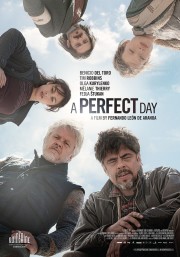A Perfect Day
We just saw this movie at home last night, and were blown away. The picture of those dogged aid workers in the midst of the civil massacres in Bosnia, covering their revulsion at horrible atrocities and their deep anger and fear and their desperate need for solidarity with one another by joking and repression awoke memories of other, roughly similar terrors that made me tremble and laugh. Laughter like that of release by “B”, the character played brilliantly by Tim Robbins, who relieves the tension by comic routines such as pretending to be a tour guide as they drive through an utterly ruined village. Or the seemingly impassive but terribly, violently tense Mambrú (Benicio del Toro). Both of them have seen too many anonymous cadavers to let another one interfere with their tasks of saving what lives they can. Thus the terrible impact of the moment where Mambrú, along with the newbie aid-worker Sophie (Mélanie Thierry), is startled by the sight of cadavers who are far from anonymous—he knows they can only be the parents of the lost little boy he has taken under his protection. Those actors, all of them, and the Bosnian interpreter Damir (Fedja Štukan) and Katya (Olga Kurylenko) contribute mightily to screenwriter-director Fernando León de Aranoa‘s revisit of the Balkan devastation he visited and filmed in reportage in the 1990s, as the conflict was winding down out of sheer exhaustion.
I just looked up references to the film on the Internet, and see that some or most critics have shielded themselves from the powerful and conflicted emotions this film arouses—fear, anger and tearful laughter. I can understand that. Let’s not talk about the horrible things we humans can do to one another, there are too many, continuing now, if not in the Balkans then in Iraq and Syria and Libya and other places. Like the bureaucratic military command of the UN Blue Helmets we see in the movie, if we stay focused on the technical details we can pretend to be calm. Until, of course, we happen upon cadavers that refuse to remain anonymous. Like that little Kurdish boy Aylan whose name we all learned, or on their still surviving relatives, now reaching out to us.
On Yugoslavia before it blew itself apart, here’s a review I wrote of a 1978 book. And a related 1995 op-ed from Newsweek, Languages don’t bind people.
